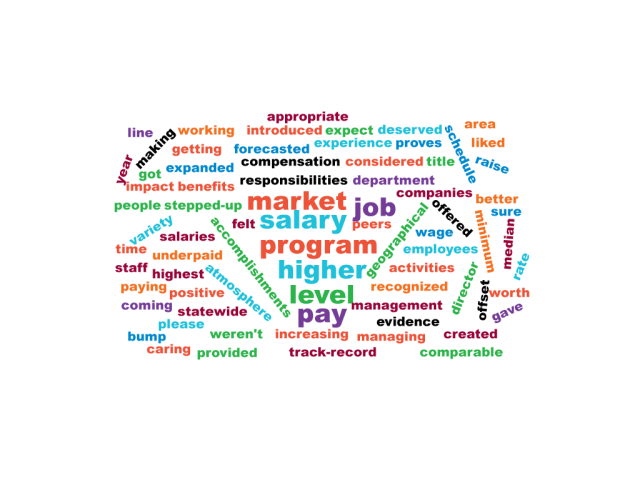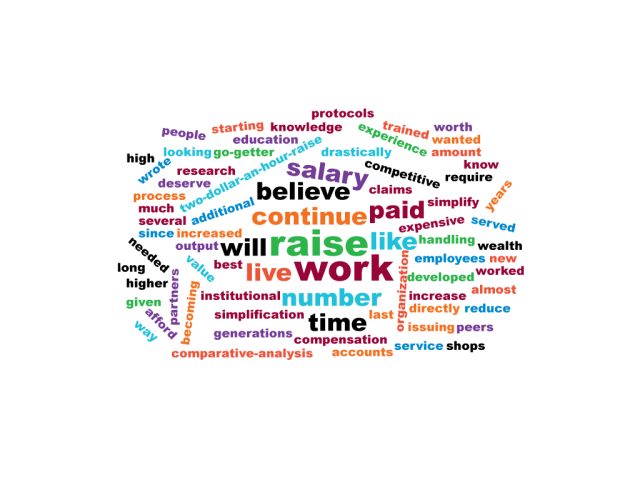
Men and women ask for pay raises at the same rate — but men get them more often
Share Now on:
Men and women ask for pay raises at the same rate — but men get them more often

Women are asking for raises just as frequently as men do, but men receive them at a higher rate, according to the latest results from our Marketplace-Edison Research Poll.
About 37% of men and 36% of women say they’ve asked for one, with 82% of men receiving the raise they asked for, compared to 74% of women.
We later conducted an unscientific survey, asking how you’ve negotiated for a raise and whether you were successful. Here’s a look at some of the key phrases from some of your responses:
Heidi Williams, a sales engineer who responded to our poll, said she was making $15,000 below the median salary base pay for her level of experience.
“In an attempt to ‘lean in’ and ‘know my worth’, I asked my boss to please pay me the median salary for my job title in my geographical area (New York City),” she told us.
The company said “no,” and argued that she hadn’t been in that position long enough to ask. So she worked hard and asked again two months later. That time around, she was given some tasks to earn the raise but was laid off before she could even begin them.
However, some women who responded to us had more luck, like Mimi Johnston, who works at a sustainable living nonprofit.
She told the company, “My track record proves I am worth it,” and was able to negotiate for more money, along with a flexible workweek and a few other personal perks.
Nate Kelly said he did a data analysis of his output versus his colleagues for a job of his several years ago. He compiled the data, presented it to management and got a raise.
“I used phrases like ‘comparative analysis,’ ‘research,’ ‘output,’ ‘competitive,’ ‘go-getter,’ and I even think I literally said I wanted to be the best,” he said.
The pay gap between men and women has led some researchers to argue that difference is, in part, because women don’t negotiate for higher salaries as often as men do. (For every dollar that American men make on average, women make about 80 cents, according to the U.S. Department of Labor.)
However, the conclusion that women ask as often as men, but don’t end up getting the raise they asked for, aligns with more recent findings, like in the 2018 study “Do Women Ask?”
The study — which surveyed 4,600 randomly selected employees in Australia — was conducted by faculty at the University of Wisconsin at Oshkosh, Cass Business School in London and the University of Warwick in the United Kingdom.
Compared to other studies, this one controlled for part-time workers. Both women and men who are part-time workers were less likely to ask for raises, but because more women are in part-time roles, that can skew the results.
“What we say is essentially it’s discrimination,” said Amanda Goodall, one of the authors of the study and a senior lecturer in management at Cass Business School. “What I liked about our study was just that it plain and simple said, ‘You can say what you like, but we’re as educated as you. We’re just as capable as you. We’ve been asking for negotiations, so the responsibility wasn’t on us.’”
And researchers are continuing to unearth new insights about gender inequality in the workplace.
Laura Kray, a professor at the University of California, Berkeley, said that she and postdoctoral researcher Margaret Lee are working on a study where they’ve obtained cover letters written by MBA students in a classroom simulation and run them through text analysis software to see if there were any major differences.
Kray said that they didn’t find any quantitative differences in terms of what both the men and women asked for. But they did find that people rate the cover letters written by the female MBA students as “more sensitive to the relationship” and more “carefully crafted.”
“Based on all best practices in negotiations and what we’re able to discern in the cover letters, there is some indication that, if anything, women were doing a better job,” she added.
But while women aren’t getting raises at the same rate as men overall, based on these studies, there are some promising takeaways from the research conducted by Goodall and her colleagues.
Men and women under the age of 40 were asking and getting raises to the same extent, Goodall said.
She noted that they aren’t sure whether it’s because of a generational shift and times are changing, or if the respondents who had success when they were younger might face less success when they’re older.
“But it’s looking good,” she said.
There’s a lot happening in the world. Through it all, Marketplace is here for you.
You rely on Marketplace to break down the world’s events and tell you how it affects you in a fact-based, approachable way. We rely on your financial support to keep making that possible.
Your donation today powers the independent journalism that you rely on. For just $5/month, you can help sustain Marketplace so we can keep reporting on the things that matter to you.




















